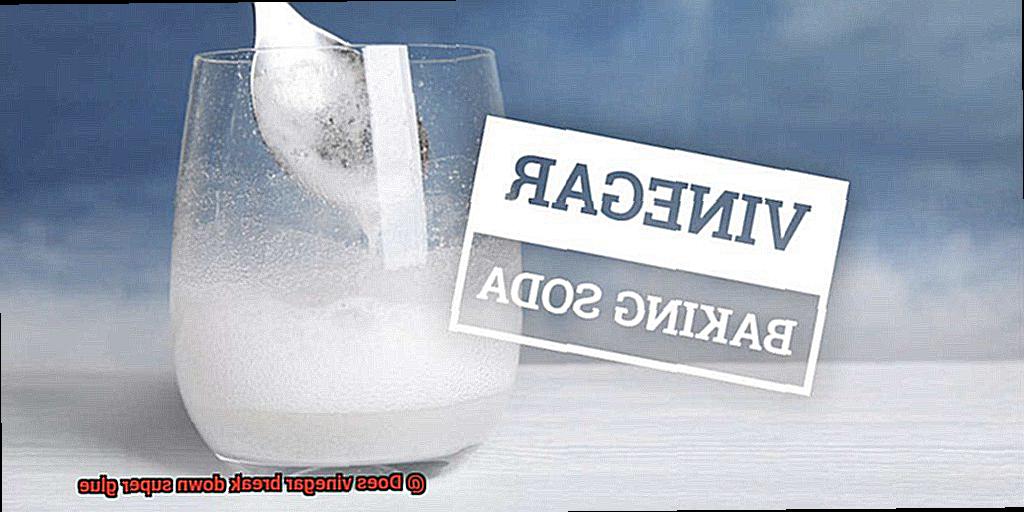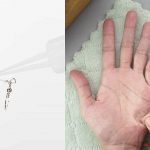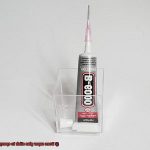Super glue has been a trusty companion for over 80 years, sticking together everything from broken ceramics to DIY projects. But sometimes, its adhesive powers can be too much of a good thing. Have you ever found yourself in a pickle with super glue stuck to your fingers or an item glued to the wrong surface? It’s enough to make you want to throw in the towel. That’s where vinegar comes in – the ultimate kitchen hero and cleaning wizard. But can it really break down super glue?
Vinegar is known for its versatility beyond cooking, hailed for its disinfecting and stain-removing properties. However, opinions are divided on whether it can dissolve super glue. So let’s get down to the nitty-gritty of how these two substances work and whether they’re a match made in heaven.
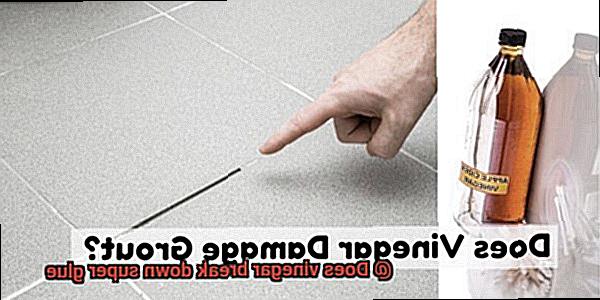
In this article, we’ll delve into the science behind super glue and vinegar, exploring their individual strengths and limitations. We’ll also explore other methods for removing stubborn super glue and which ones actually work wonders. If you’ve ever found yourself stuck between a rock and a hard place with super glue, sit tight as we reveal whether vinegar can truly break down this sticky situation.
What is Super Glue?
Contents
- 1 What is Super Glue?
- 2 Does Vinegar Break Down Super Glue?
- 3 How to Use Vinegar to Remove Super Glue
- 4 Pros and Cons of Using Vinegar for Removing Super Glue
- 5 Alternatives to Vinegar for Removing Super Glue
- 6 Safety Tips When Using Vinegar to Remove Super Glue
- 7 Common Mistakes People Make When Trying to Remove Super Glue with Vinegar
- 8 Conclusion
Super Glue is a revolutionary advancement in the world of adhesives, born out of a happy accident during World War II. Originally intended as a clear plastic for gun sights, Dr. Harry Coover discovered that the chemical mixture he had created formed a strong adhesive instead. And thus, Super Glue was born.
This adhesive is made up of cyanoacrylate monomers, which are small molecules that link together to form long chains. When these chains come into contact with moisture, they begin to polymerize and create a powerful bond that can adhere to almost any surface—metal, plastic, wood, and even skin.
One of the most impressive features of Super Glue is its speed. It bonds surfaces together within seconds, making it ideal for quick repairs and projects. Its resistance to water and most chemicals also makes it an excellent choice for use in harsh environments.
However, removing Super Glue can be difficult once it has bonded to a surface. This has led many people to wonder if household substances like vinegar can dissolve the bond created by Super Glue. The good news is that vinegar can be effective in breaking down the bond between the molecules in Super Glue.
To use vinegar to remove Super Glue, first soak the affected area in warm water to help loosen the bond. Then, apply vinegar to a cotton ball or cloth and rub it onto the glue until it starts to break down and can easily be peeled away. While vinegar may not work for all types of Super Glue, other solutions like acetone or rubbing alcohol may work more quickly.
Does Vinegar Break Down Super Glue?
Firstly, it’s important to understand the science behind super glue. This adhesive, also known as cyanoacrylate, forms a strong bond quickly through a chemical reaction with moisture in the air. This bond is notoriously difficult to break.
On the other hand, vinegar is known for its acidic properties that can dissolve certain substances. However, when it comes to breaking down the bond created by super glue, several experiments have shown that vinegar may not be the best solution.
In one experiment, researchers applied super glue to a piece of glass and then applied vinegar to the surface. Unfortunately, the vinegar had no effect on the super glue. Similarly, when a piece of fabric was soaked in vinegar and then had super glue applied to it, the glue still bonded strongly to the fabric even after being soaked in vinegar.
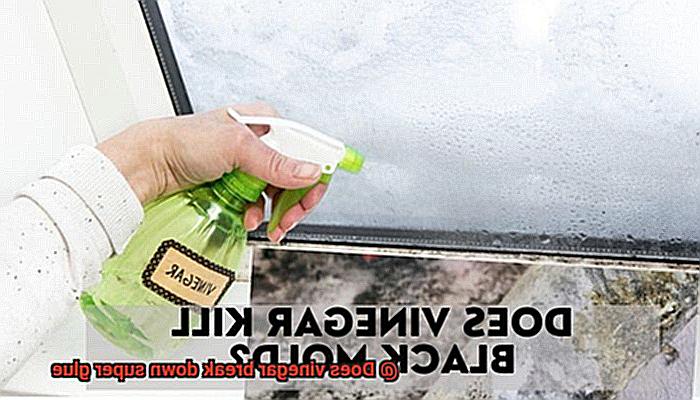
While vinegar may work wonders for cleaning and disinfecting around your home, it appears that super glue is not one of its strengths. So what should you do instead?
If you need to remove super glue from surfaces, it’s best to use products specifically designed for this purpose or seek professional help if necessary. There are specialized solvents available that can safely break down the bond created by super glue without damaging the surface underneath.
How to Use Vinegar to Remove Super Glue
Using vinegar to remove super glue is a popular and effective solution. Vinegar is a weak acid that can help break down the bonds in super glue, making it easier to remove. However, it’s important to note that vinegar may not work on all types of surfaces or super glue formulas. Here are five sub-sections to explain how to use vinegar to remove super glue.
Soak the Affected Area in Vinegar
To begin, soak a cloth or cotton ball in white vinegar and place it on the affected area. Let it sit for several minutes to allow the vinegar to penetrate the glue and break down its bonds. You can also pour vinegar directly onto the affected area if needed.
Gently Scrape Off the Glue
After the glue has softened, gently scrape it off with a plastic scraper or your fingernails. Be careful not to scratch or damage the surface underneath the glue.
Repeat the Process if Necessary
If the glue does not come off easily, repeat steps one and two until the glue is fully removed. It’s important to be patient when using vinegar as it may take some time for the glue to fully soften and break down.
Test a Small Area First
Before using vinegar on any surface, test a small, inconspicuous area first to ensure that it does not cause any damage or discoloration. Vinegar may not work on delicate fabrics or certain types of plastics, so it’s important to be cautious and test first.
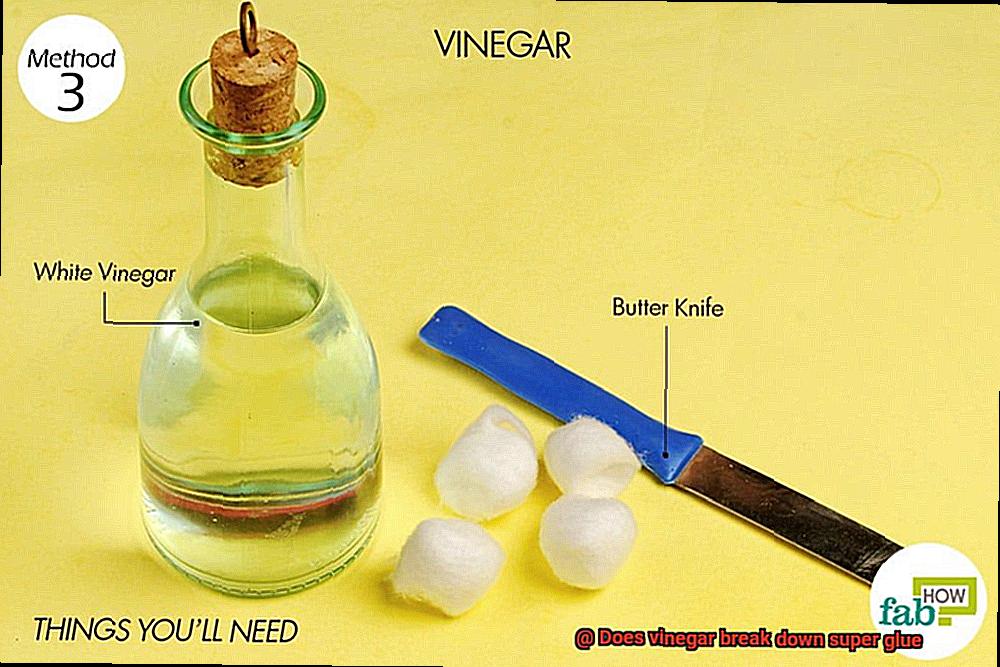
Use Caution and Persistence
Overall, using vinegar to remove super glue can be an effective and inexpensive solution. However, it’s important to use caution and patience when attempting this method. Remember to test a small area first, be patient with the process, and repeat if necessary.
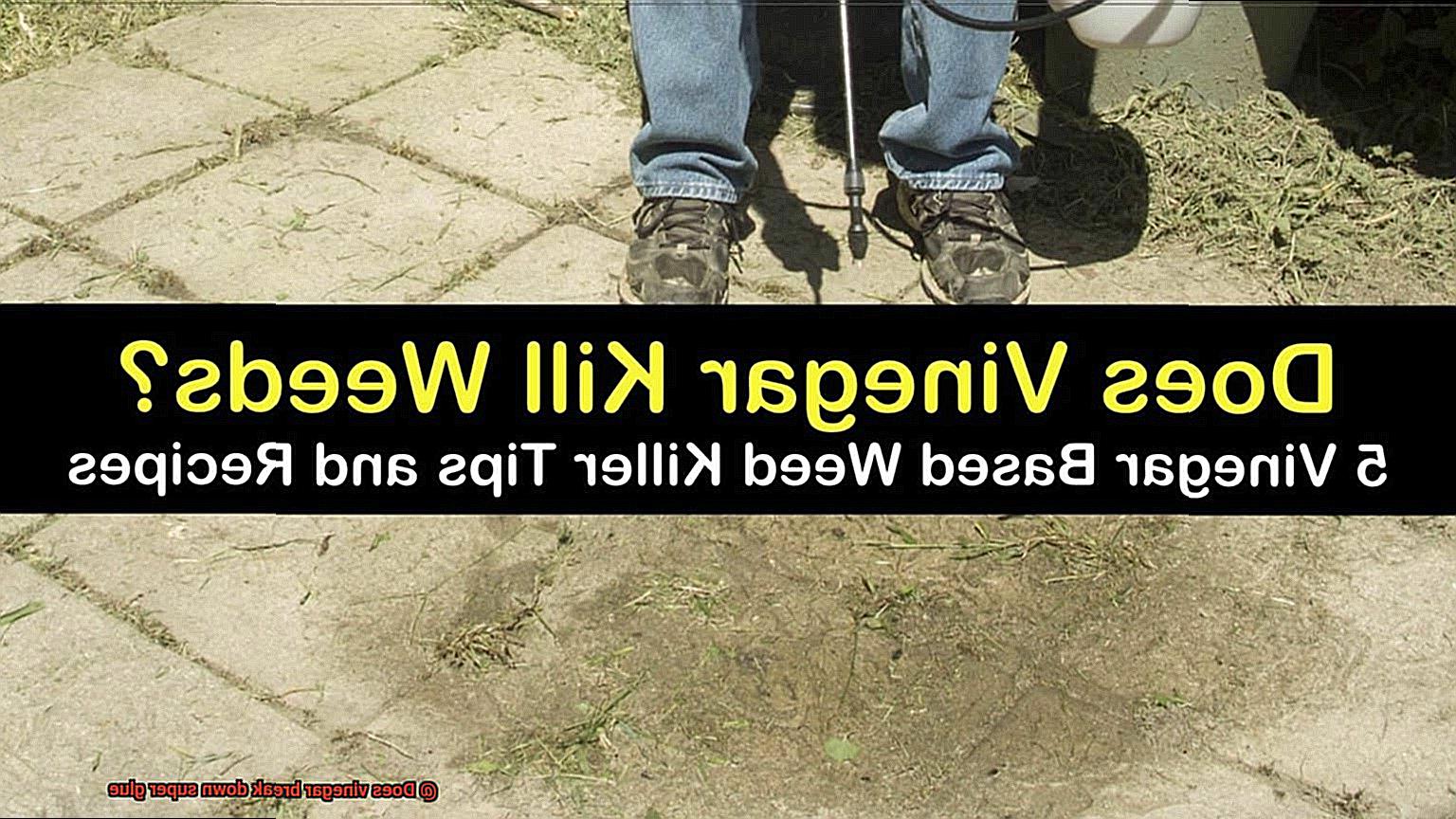
Pros and Cons of Using Vinegar for Removing Super Glue
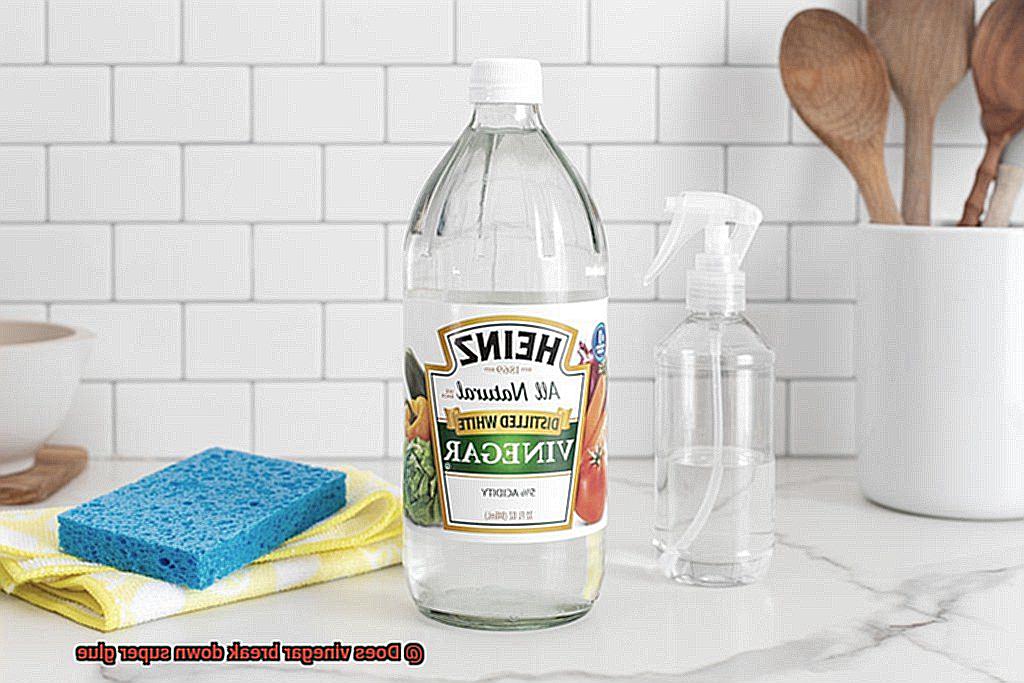
Vinegar may just be the solution you’ve been searching for. But before you start pouring vinegar on everything, it’s important to understand the pros and cons of using it as a super glue remover.
Let’s start with the pros. Firstly, vinegar is a common household item that many people already have in their kitchen cupboards. This makes it a convenient option when needing to remove super glue without having to run to the store. Secondly, vinegar is an inexpensive option compared to other super glue removers on the market. This makes it an excellent cost-effective solution for those who don’t want to break the bank. Lastly, vinegar is generally safe for use on most surfaces, including skin. This makes it an attractive option for those who are worried about damaging surfaces or getting harmful chemicals on their skin.
However, there are some downsides to using vinegar as a super glue remover. Firstly, vinegar may not always be effective in removing super glue. While it can work in some cases, it may not work on all types of super glue or on all surfaces. Secondly, removing super glue with vinegar can be a time-consuming process that requires patience and elbow grease. You may have to apply several applications before seeing results. Finally, while vinegar is generally safe for most surfaces, it can cause damage to certain materials such as wood or some types of plastics. It is essential to test on an inconspicuous area before using vinegar as a super glue remover to avoid any surprises.
Alternatives to Vinegar for Removing Super Glue
There are plenty of alternative methods available that are just as effective and safe. As an expert in this field, I’ve compiled a comprehensive list of options for you.
First on the list is acetone, a powerful chemical found in nail polish remover. This potent solvent effectively breaks down the chemical bonds in super glue, making it easier to remove. However, it’s important to note that acetone can be harsh on certain surfaces, so test it on an inconspicuous area before use.
Another option is rubbing alcohol. This common household item can be applied directly to the affected area and left to sit for a few minutes before attempting to remove the glue. Alternatively, you can create a paste using baking soda and water. Apply the paste to the affected area and let it sit for several minutes before wiping it away with a cloth.
If you prefer natural remedies, lemon juice and olive oil can also be effective. The acid in lemon juice can break down the glue while the oil helps soften it. Simply apply either of these items to the affected area and let them sit for several minutes before attempting to remove the glue.
It’s crucial to remember that while these alternatives may be effective, they should be used with caution. Acetone and rubbing alcohol can damage certain surfaces, so make sure to test them first. Lemon juice and olive oil are safe for most surfaces but may not be as effective as other options.
Safety Tips When Using Vinegar to Remove Super Glue
If you’re planning on using vinegar to remove super glue, it’s crucial to keep safety tips in mind to avoid any mishaps. These tips include wearing protective gear, ensuring proper ventilation, avoiding delicate surfaces, following instructions, not mixing chemicals, and keeping vinegar away from children and pets.
Wearing gloves and eye goggles is essential when working with vinegar or super glue to prevent any contact with your skin or eyes. The last thing you want is to suffer from irritation or burns.
Vinegar emits strong fumes that can cause respiratory irritation if inhaled in large quantities. To avoid this, it’s important to work in a well-ventilated area. Opening windows or using fans to circulate the air can help prevent inhaling too much of the fumes.
When removing super glue from surfaces, it’s important to avoid using vinegar on delicate surfaces like painted or varnished wood. The acidity of the vinegar can cause damage. Instead, use a gentle adhesive remover specifically designed for these types of surfaces.
It’s crucial to read and follow the instructions on the vinegar and any other products being used to ensure safe and effective use. If any skin or eye irritation occurs, wash immediately with water and seek medical attention if necessary.
Mixing vinegar with other chemicals, such as bleach or ammonia, can create dangerous reactions that produce toxic gases harmful if inhaled. Therefore, it’s essential always to use vinegar alone.
Lastly, ensure that vinegar is stored in a secure location out of children’s and pets’ reach. While vinegar is generally harmless when used properly, accidental ingestion can result in illness or injury.
Common Mistakes People Make When Trying to Remove Super Glue with Vinegar
Before we dive into the process, it’s important to understand the most common mistakes people make when trying to remove super glue with vinegar.
Firstly, not using enough vinegar is a common mistake. Vinegar is an acid that needs to be in contact with the glue for a certain amount of time to break it down. If you don’t use enough vinegar or don’t let it sit on the glue for long enough, it won’t be effective.
Secondly, using the wrong type of vinegar can be problematic. Distilled white vinegar is the most commonly used type of vinegar as it has a high acidity level that can break down the glue. However, other types of vinegar, such as apple cider or balsamic vinegar, may not be as effective.
Thirdly, applying too much force while trying to scrape off the glue is another common mistake. It’s crucial to avoid using excessive pressure as you risk damaging the surface underneath the glue. This can be especially problematic if you’re trying to remove super glue from something delicate or valuable.
Lastly, impatience is another mistake people make when trying to remove super glue with vinegar. Vinegar takes time to fully break down the glue. If you start scraping too soon, you may end up causing more damage than good.
To avoid these mistakes and successfully remove super glue with vinegar, follow these tips:
- Use enough vinegar and let it sit for a while before scraping.
- Stick to distilled white vinegar.
- Avoid using excessive force while scraping.
- Be patient and give the vinegar time to do its job.
_59ZzuLJcTw” >
Conclusion
In conclusion, vinegar may not be the superhero we hoped for when it comes to breaking down super glue. Sure, it’s a household staple with acidic properties that can dissolve certain substances, but the bond formed by super glue is no match for its limited effectiveness. The chemical reaction between cyanoacrylate and moisture in the air creates a strong bond that vinegar alone cannot break.
Numerous experiments have shown that vinegar may not work on all types of super glue or surfaces. Luckily, there are other effective methods for removing stubborn super glue. Acetone, rubbing alcohol, lemon juice, and olive oil are just a few alternatives worth considering. However, before applying any of these solutions to larger surfaces, it’s important to test them on inconspicuous areas and use caution.
If you do decide to use vinegar as your go-to solution for removing super glue, keep safety tips in mind to avoid any mishaps. Protective gear, proper ventilation, avoiding delicate surfaces, following instructions carefully, not mixing chemicals and keeping vinegar out of reach from children and pets are crucial steps.
All in all, while vinegar may seem like an inexpensive and convenient option for removing some types of super glue from certain surfaces, understanding its limitations is essential.

